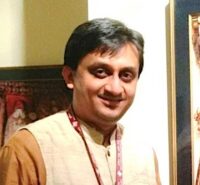
An Indian citizen with close to nine years of lived experience in China, he is an alumnus of Indian School of Business, Hyderabad, and currently the Director of Special Projects at INDICA. His post-graduate specialization in Strategy, Leadership and Marketing included a study of research methods. His professional experience includes stints as a Market Leader at a Global Fortune 50 firm while he has served a term on the Board of a Shanghai-based not-for-profit. His academic writings span some aspects of ancient Indian chronology, Indian Knowledge Systems, Landscape in Indic texts, Ancient Indian Jurisprudence, Ideas of India and Philosophy. Other professional and pro-bono pursuits have included building differentiated digital platforms for Indic texts targeted at specific learning and research needs and music. His research-based compositional Sanskrit music album Bhārata and her Kāśmīra has been listed by the Indira Gandhi National Centre for the Arts. His subsequent music album Indian Knowledge Systems and Yāskācārya’s Nirukta has recently been accepted for listing by the Vedic Heritage Portal. In 2022, the National Museum Institute invited him to contribute content for multiple projects currently under way, including ones on Jammu Kashmir & Ladakh and Kedarnath.
Abstract of the lectures
On Sanskrit’s Vitality and Role: Some Reflections
There could be many ways to respond to the pronouncement that Sanskrit is supposedly dead. One way would be to assess the pronouncement empirically. Doing so could entail thinking about questions such as: 1) Has anything new and original been published in Sanskrit after it was pronounced dead? 2) If yes, is there a published bibliography of original Modern Sanskrit Literature and which one is the most comprehensive? 3) Are there any trends to observe in contemporary Sanskrit publications? 4) If yes, what has already been identified?
The first part of this lecture series will look to foreground answers to these questions (and more) from published sources to respond empirically to the pronouncement about Sanskrit’s supposed death. The second part will commence by invoking the role of Sanskrit as “the Great Integrator” (as seen by Dr V. Raghavan) before diving deeper into some facets of that idea using the prism of a recent Sanskrit music album: Bhārata and her Kāśmīra